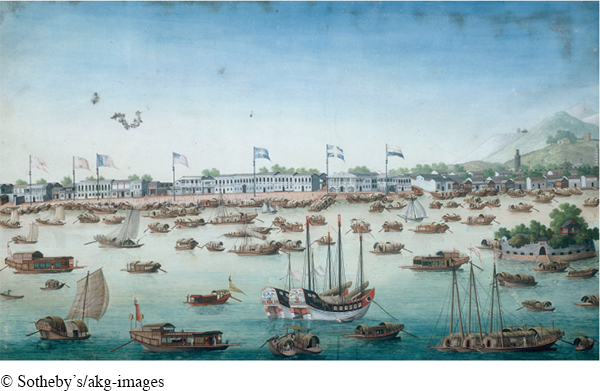Foreign Trade and Foreign Wars
Jefferson and Madison led the opposition to Hamilton’s policies. Their supporters were mainly southern Federalists who envisioned the country’s future rooted in agriculture, not the commerce and industry supported by Hamilton and his allies. Jefferson agreed with the Scottish economist Adam Smith that an international division of labor could best provide for the world’s people. Americans could supply Europe with food and raw materials in exchange for manufactured goods. When wars in Europe, including a revolution in France, disrupted European agriculture in the 1790s, Jefferson’s views were reinforced.
Although trade with Europe remained the most important source of goods and wealth for the United States, some merchants expanded into other parts of the globe. In the mid-1780s, the first American ships reached China, where they traded ginseng root and sea otter pelts for silk, tea, and chinaware. Still, events in Europe had a far greater impact on the United States at the time than those in the Pacific world.

The French Revolution (1789–1799) was especially significant for U.S. politics. The Revolution disrupted French agriculture, increasing demand for American wheat, while the efforts of French revolutionaries to institute an egalitarian republic gained support from many Americans. The followers of Jefferson and Madison formed Republican societies, and members adopted the French term citizen when addressing each other. Moreover, the strong presence of workers and farmers among France’s revolutionary forces sparked further critiques of the “monied power” that drove Federalist policies.
In late 1792, as French revolutionary leaders began executing thousands of their opponents in the Reign of Terror, wealthy Federalists grew more anxious. The beheading of King Louis XVI horrified them, as did the revolution’s condemnation of Christianity. When France declared war against Prussia, Austria, and finally Great Britain, merchants worried about the impact on trade. In response, President Washington proclaimed U.S. neutrality in April 1793, prohibiting Americans from providing support or war materials to any belligerent nations—including France or Great Britain.
While the Neutrality Proclamation limited the shipment of certain items to Europe, Americans simultaneously increased trade with colonies in the British and French West Indies. Indeed, U.S. ships captured much of the lucrative sugar trade. At the same time, farmers in the Chesapeake and Middle Atlantic regions filled the growing demand for wheat in Europe, causing their profits to climb.
Yet these benefits did not bring about a political reconciliation. Although Jefferson condemned the French Reign of Terror, he protested the Neutrality Proclamation by resigning his cabinet post. Tensions escalated when the French envoy to the United States, Edmond Genêt, sought to enlist Americans in the European war. Republican clubs poured out to hear him speak and donated generously to the French cause. But the British also ignored U.S. neutrality. The Royal Navy stopped U.S. ships carrying French sugar and seized more than 250 vessels. The British also supplied Indians in the Ohio River valley with guns and encouraged them to raid U.S. settlements.
More concerned with addressing issues with Britain, President Washington sent John Jay to England to resolve concerns over trade with the British West Indies, compensation for seized American ships, the continued British occupation of frontier forts, and southerners’ ongoing demands for reimbursement of slaves evacuated by the British during the Revolution. Jay returned from England in 1794 with a treaty, but it was widely criticized in Congress and the popular press. While securing limited U.S. trading rights in the West Indies, it failed to address British reimbursement for captured cargoes or slaves and granted Britain eighteen months to leave frontier forts. It also demanded that U.S. planters repay British firms for debts accrued during the Revolution. While the Jay Treaty was eventually ratified, it remained a source of contention among Federalists.
Exploring American HistoriesPrinted Page 226
Exploring American Histories Value EditionPrinted Page 168
Chapter Timeline